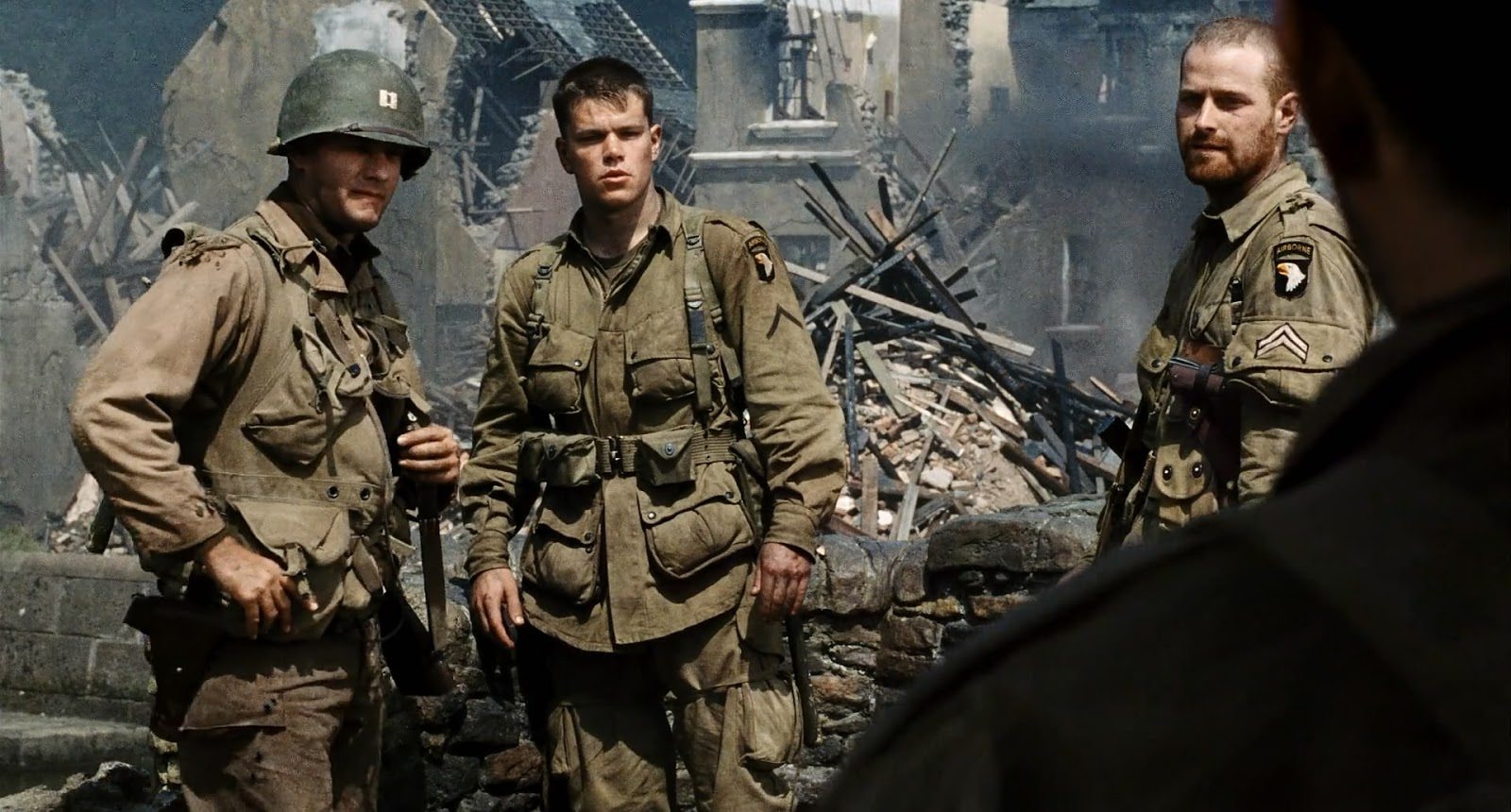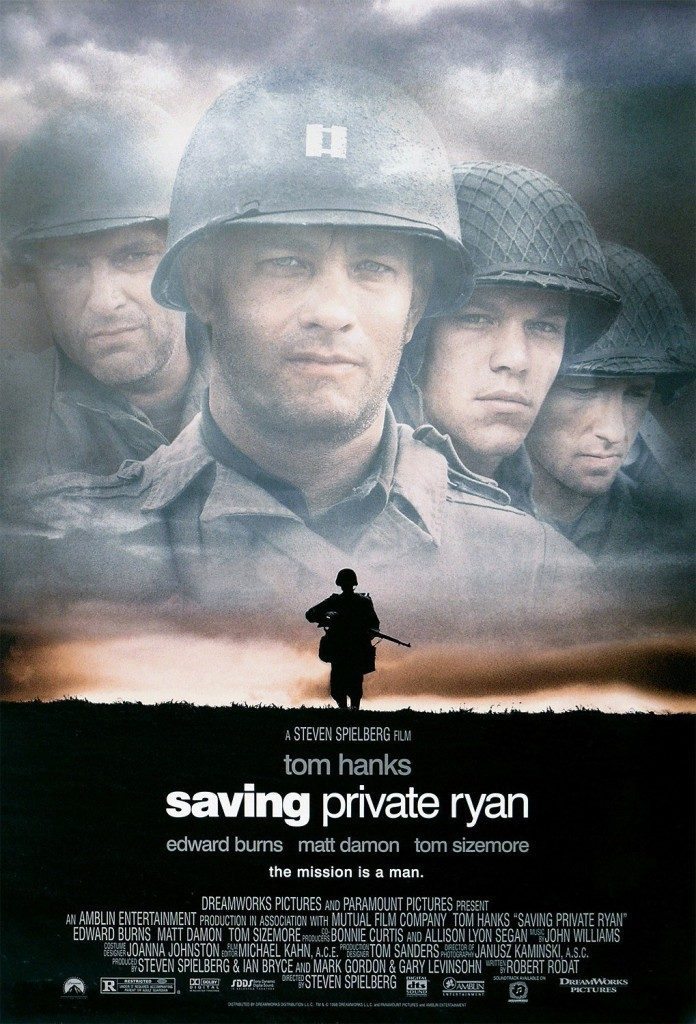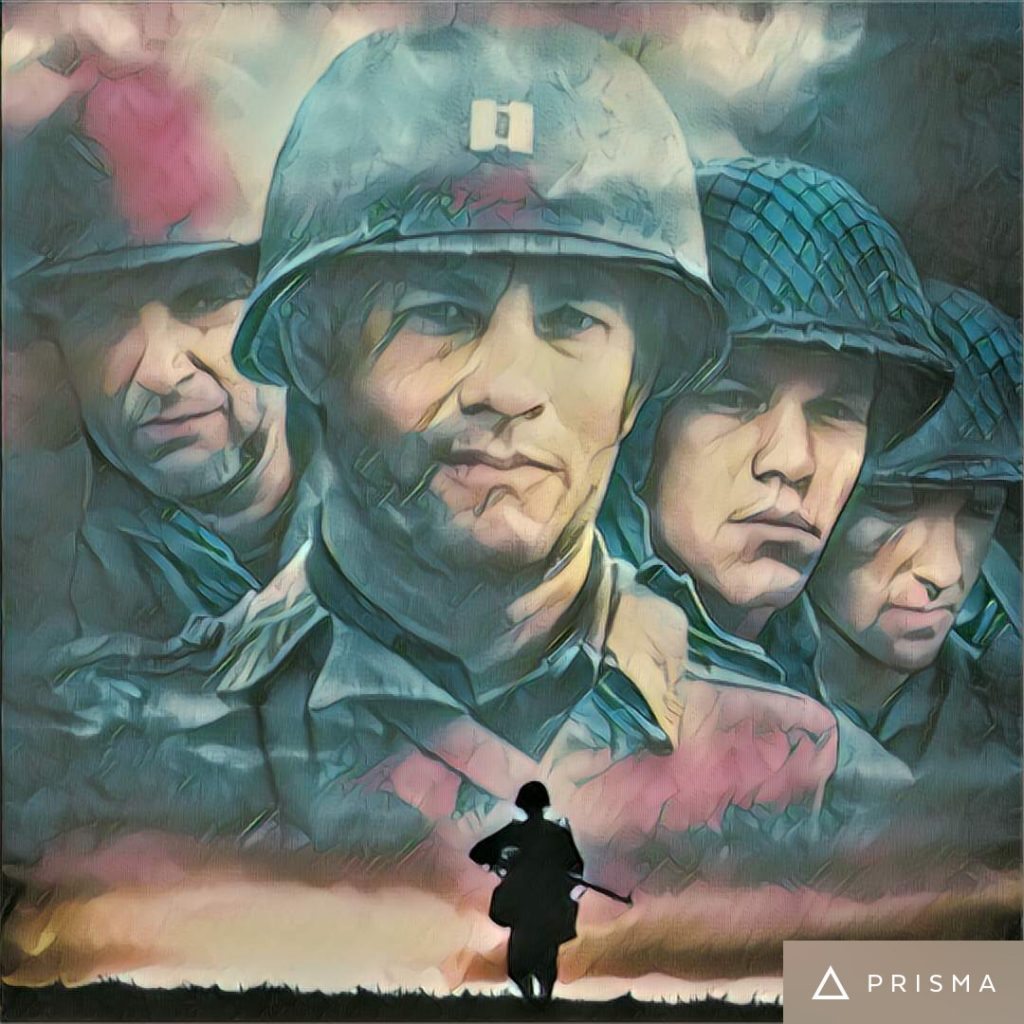June 6, 1944. Omaha Beach. A 26 minute opening action scene that is unforgettable. Platoons of men are ferried along in landing craft due for the harsh shoreline. They are being carried for an amphibious assault on the bunkers and trenches of Omaha Beach. Their eventual goal is to clear the tops of the cliffs of enemy fighters and everyone knows the grounds below will be killing fields. They will become fatalities. The devastating German artillery fire is going to rip many of them to pieces. Vomit, bullets, dead men noise, and blood. Bodies float in the ocean, blood sullies the water, men cry in agony, and medics cannot attend to every armless and legless man who is alive yet dying. The pillboxes and machine gun nests deliver more death.
What little insight in this article could I even add to the bigness of what took place on screen? Or what took place in real life? The movie was a gut punch right into my stomach and up into my heart. Seeing this movie again was difficult but appreciated. What more could be said about SPR that could add or subtract to its value? Historian Stephen Ambrose, author of D-Day and Citizen Soldiers, thought it “the finest World War II movie ever made.”
In 1998 when the movie first arrived at theatres I sat nearly alone for an afternoon matinée and was simply stunned into a whimpering silence by what was unfolding before me. I’m sure the three senior movie goers sitting in almost theatre felt the same way I did. Re-watching it on television made it no less visceral to me. Yet critics felt it had a sappy prologue and epilogue; they were correct. The movie is not a masterpiece but it comes very close to being one.
When I first saw it with my brother, we came at the right time, during an afternoon show while everyone else was away at work. The absence of a crowd allowed us to sit deep inside ourselves, and ponder what absolute horror the soldiers in the opening scene of Saving Private Ryan were going through. Unless we were actually at Normandy, not one of us had a chance of comprehending the grim scene these soldiers partook of. This was not a time for eating pop-corn and opening candy wrappers. This was not a time for twiddling on the cell phone or chatting with your date.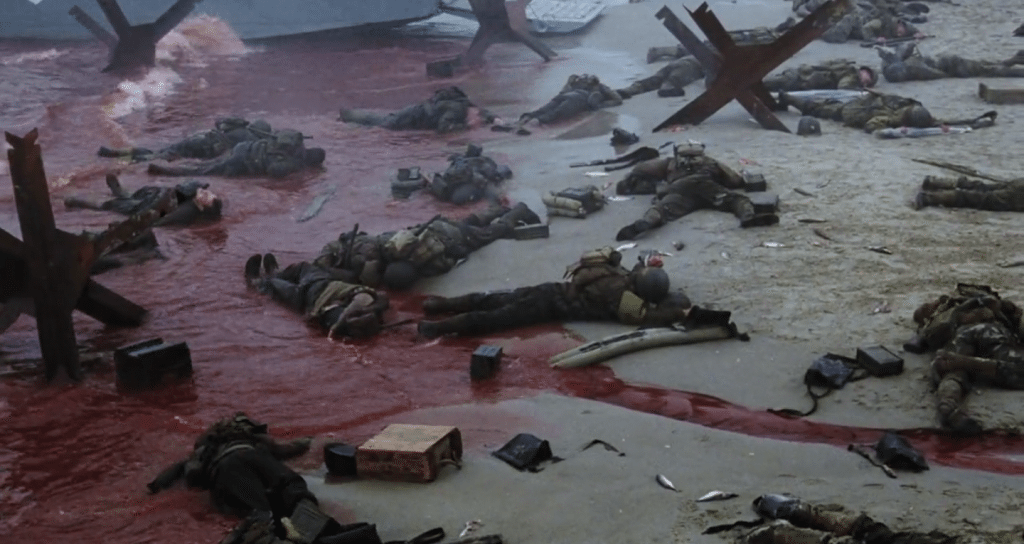
German machine guns sprayed the men below with flesh-shredding bullets and bodies are ripped apart by the artillery fire. Those who served on those beaches were interviewed after viewing the movie and all said the violence and action was exactly as it was back then, 70 long years ago.
The movie is so brutal to handle. We are forced by our engrossment to confront the chaos. The intake of violence and noise is a lot and our emotions roil. We winced as a soldier was hit by a bullet and he falls to the sand, and then another one falls. Those who are not moved to gasp or moved to grip the edge of their seat must be dead. The action erupting on-screen punches the viewer in the stomach again and again. Crowds that came to the theatres were moved to tears by the powerful film; many in the audience were of the Greatest generation.
A soldier walks around the battlefield in a daze and looks for his arm that has been blown off. He picks the arm up and we watched aghast at what just occurred. Hollywood has had a lot of misfires when it came to making war moves, but once in a while they get it right. Saving Private Ryan is one of those movies. This movie has been voted again and again as one of the best war films ever. In fact, when the movie was over, I sat alone in deep thought as the credits rolled. I sat in the darkness of the room, alone with my thoughts until the ushers opened the door of the large room. I went to the ticket counter and purchased another ticket for the next viewing. I saw it twice in one day.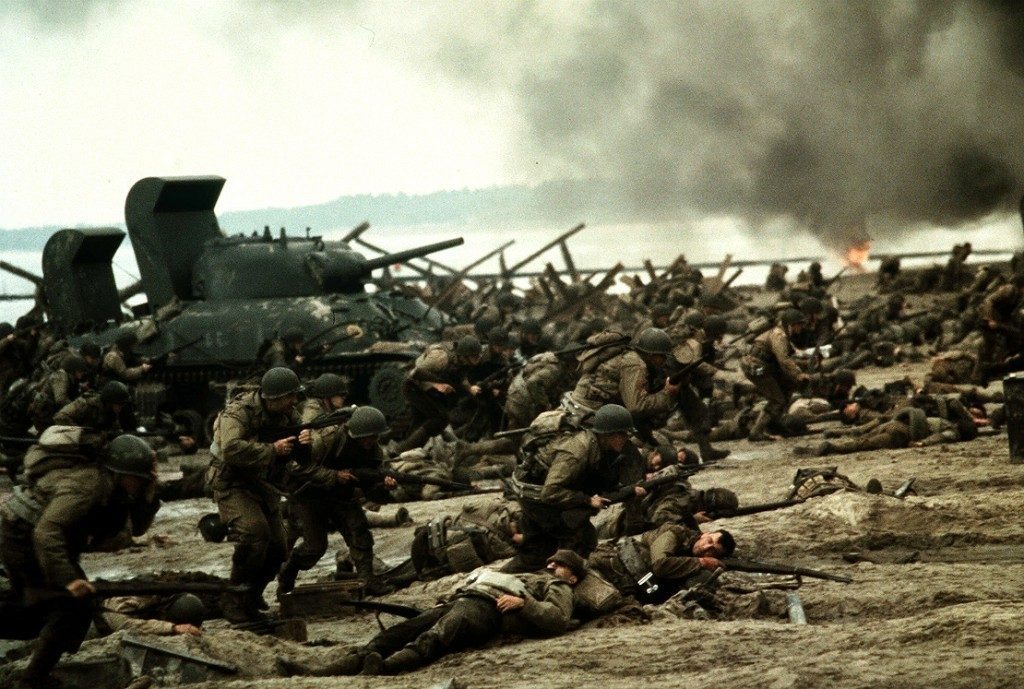
Yes, the opening scene is very strong. The middle portions of it have some very good moments, and some not so but as a whole the movie remains intact. There are many memorable scenes. Viewing the movie 18 years later I still enjoy it. Saving Private Ryan came into theatres at the same time as another one of my movie favorites did; Terence Malick’s The Thin Red Line. Loved that movie and saw that too right about the same month if I recall.
Saving Private Ryan won a few Oscars, five in total, but it lost to awful Shakespeare in Love for Best Picture. Despite some of the harsh criticism leveled at it Saving Private Ryan was a critical and commercial success. For every critic that hated the movie, there were far too many others that believed it was a powerful experience for viewers.
Director Oliver Stone believed the film promoted the worship of World War II as the good war. Screenwriter William Goldman blasted the movie and blasted Spielberg with his review. Goldman believed the movie to be pretentious. But what Stone and Goldman don’t understand is the story is intelligent and deliberate in its telling. There has to be conflict in order for us to answer questions. This particular story has to be coherent in order to answer the particular question that each man in Capt. Miller’s squad asks, “is it worth it?” The journey has to be so unique, and traveled by such average men so we can relate to what it is they are experiencing. These men are not Achilles or Beowulf. As they journey, we cannot understand what the end result of their actions will be, but we can understand some portion of the emotions they are feeling. Who can know the future? So, we must allow the story to unfold in some type of logical progression so our question can be answered.
I believe the critics responses says more about their own biases than it does about what the film lacks. Arrogant slobs.
Some critics, as they always do, felt it glorified war. Tens of thousands of others would say otherwise. The film is so very realistic, and it is a wonder that a few voices of dissent could so vociferously critique what the public likes, wants and in this case needs. The movie told the story of millions of men who served on the battlefields during WW II. Over 60 million people died. Over 2.5% of the population. It was a terrible war but it is something that had to be fought.
Sure, some can agree that the prologue and epilogue of the film are sentimental. I believed that. Did I cry? You better believe it. When Ryan saluted at the end, I bawled and wiped my nose right into my shirt sleeve. The movie was constructed this way to elicit emotion but regardless of the director’s intent we must feel connected to the protagonists by some means.
What else should have the ending been? Should Ryan have committed suicide after carrying the burden of knowing that these Rangers died for him? Should we have found Ryan laughing in a bar like Joe Pesci from Goodfellas, drinking beers and telling funny stories about the war? What the heck did the critics want?
Or should the proper response be that Ryan lived a good life, that he become a good man, and paid the debt to those who died on blood-drenched beaches and every battle ground. What is the logical ending to a movie with a story like this?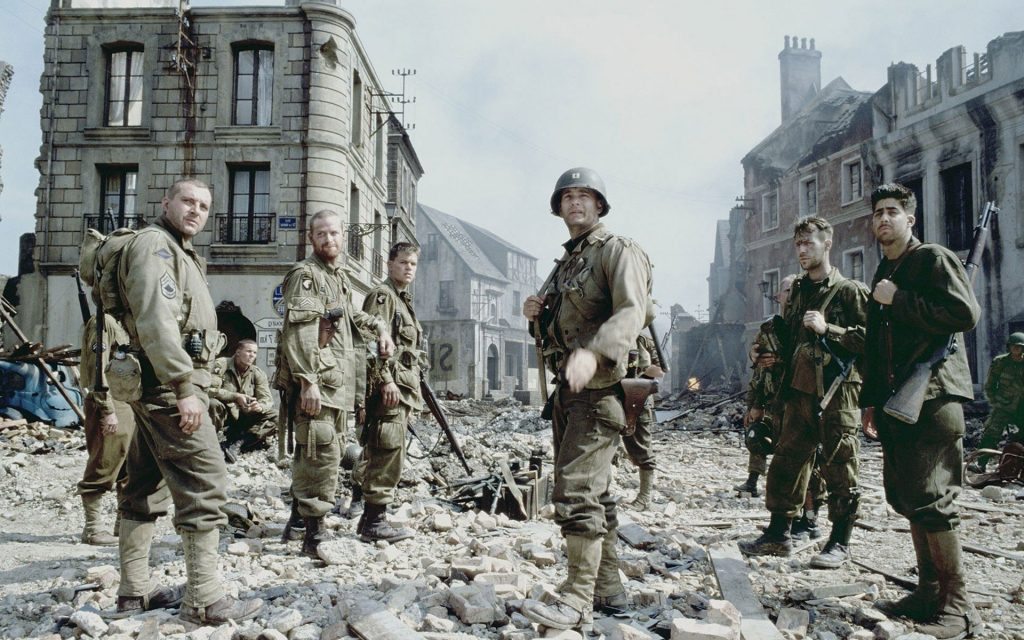
There are far too many questions and answers taking place in the movie. Is it absurd for men to kill other men, is it idiotic for Capt. Miller’s men to rescue Ryan at the expense of their own lives? Is it crazy for the sharpshooter Private Jackson to take a position in the clock tower and therefore leave himself open to attack? Is it foolish for Private First Class Caparzo to rescue the child? Does Miller’s squad openly question the foolhardiness of the task as they also question how it takes them away from doing what they do best? Killing… yes it is all absurd here.
But it makes sense to them and it will make sense to us. There has to be a comprehensible conflict in the story or there isn’t a tale to tell. Spielberg has us experience the same questioning process that the group is going through. We journey with the soldiers as they lose man after man, we embark on a trip as they question the justification for what they do. We listen to Miller and Upham discuss Emerson, “War educates the senses, calls into action the will, perfects the physical constitution, brings men into such swift and close collision in critical moments that man measures man.” and we learn they are all normal men. Each with their own fears and responses to the violence around them.
During the 10 day boot camp the actors went through, Director Spielberg had them sequestered from Actor Matt Damon, in order to build resentment against him. It’s noted that Damon’s character Ryan had no comprehension of how brutal the fighting had been. Damon’s character was a paratrooper who landed far inland and therefore did not see the brutality on the beach heads. Tom Hanks character, Capt. Miller, knew very well how much fighting had been done. These were Rangers and they had been through so much fighting. Capt. Miller was on the edge of a nervous breakdown. This dichotomy between Ryan and Miller worlds allows the viewer to comprehend that Ryan does not realize the enormous sacrifice Capt. Miller and his men have made for him.
The question articulated by each soldier in the movie is, “is it worth it?” and we know when we see Ryan as he asks, “did I earn it” And each question is treated with a resounding YES. YES and again yes. Ask any man who has served in the military how stupid can some missions be, and they will tell you that some are stupid. But duty takes place over idiocy and erases questions and supplants them with answers. The noble work erases out ignoble things that other men do.
Sgt. Horvath , played by Actor Tom Sizemore states to his fellow soldiers, “I don’t know. Part of me thinks the kid’s right. What’s he done to deserve this? He wants to stay here, fine. Let’s leave him and go home. But another part of me thinks, what if we stay, and by some miracle we actually make it out of here alive? Someday we might look back on this and decide that saving Private Ryan was the one decent thing we were able to pull out of this whole godawful, shitty mess.”
Men do not need to die in a combat zone to do honorable things. But by their very sacrifice are they able to earn “It”? Ryan’s character solely by living a good life has earned what Capt. Miller asked him to do, as he lay dying…Miller said, “earn it.” And Ryan does. Rather than being a selfish father or husband or uncle, Ryan has sacrificed the things he wants to in order to obtain the things he should have. Dignity, respect for others, a productive yet likely unremarkable life and yet all good choices that makes him a good man.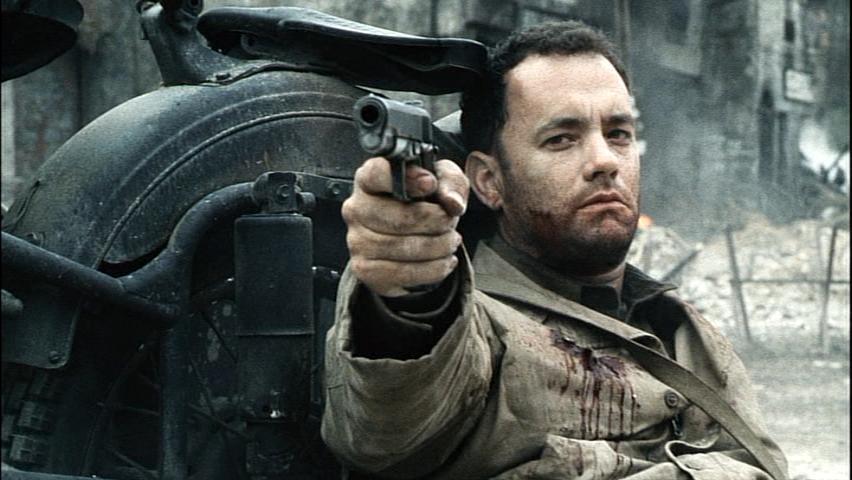
No man can live forever. Many men yearn for a life that will last, and yet these same men don’t know what to do with the life they currently have. Yet, Capt. Miller’s men are average men and they live as if there is no tomorrow. They know what they want; they want to go home to their families and live very regular lives. But they go out of the fire and straight into the furnace. They cram a full life into the little time they have. Should they shudder in fear like the Emerson quoting technician Upham? Certainly not. This is not a glorification of war, or a pro WW II movie as Stone or critics thought. These men must kill. Every time someone acts with compassion a catastrophe occurs. The answer to whether we should be civil with enemy soldiers is an okay thing to do is frankly wrong thinking to have here. In our modern world ISIS will not come at us with compassion and we should not do so with them.
Upham watches Wade die and he also pled with Capt. Miller to let one of the German soldiers go because Upham believed killing the soldier was wrong. But these choices are all wrong. Later, Upham allows a .30 team to die during the Battle of Ramelle because Upham was frozen with fear. Eventually Capt. Miller will die after being shot by the same German soldier Upham beg Miller to let live. Upham will eventually overcome his fears and he will kill Miller’s killer.
Each of these characters fulfills the role tasked to them. They are the Joe-everyman that rescues Ryan. Having a superhero, who can live forever, and rescue Ryan would be ludicrous. Ryan finally understands Miller’s soldiers sacrifices, because these outpourings of grit and immense love come from ordinary men, and who do extraordinary things. This allows the logical conclusion of the story. Ryan has to live a good life. He earned it. And for the men of 2nd Ranger Battalion and the 101 Airborne, it was all worth it. But for all of those deaths and their sacrifices…we must ask…
Are we worthy of them? How do we ever pay such a debt—and to whom?
*The views and opinions expressed on this website are solely those of the original authors and contributors. These views and opinions do not necessarily represent those of Spotter Up Magazine, the administrative staff, and/or any/all contributors to this site.
[jetpack_subscription_form]
Brought to you by the dudes at Spotter Up
[amazon_link asins=’B008CBZX7E,1405882719,1520708521,074322454X,B00OTUC5RS,B005GYSUYI,0425213757′ template=’ProductCarousel’ store=’spoup-20′ marketplace=’US’ link_id=’a1476bb3-83ae-11e7-b64c-694c7cd8fc5b’]

